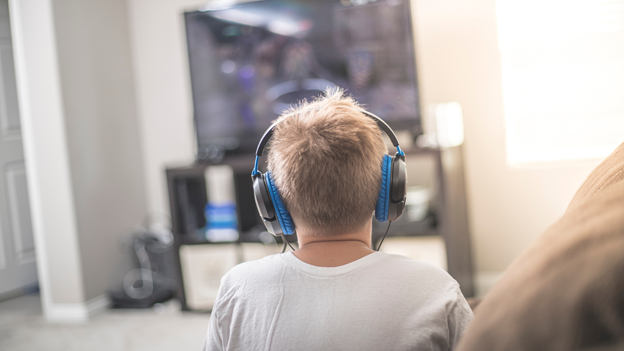Do Video Games Cause Anxiety?

Video games are often scrutinised for causing a whole host of mental health problems like aggression, violence and depression. However, in recent times the more we learn about video game addiction and its effects on mental health, the more we hear about anxiety amongst gamers. In this article, we are going to explain the complex relationship between excessive video games and anxiety.
Content
What is Video Game Addiction?

We should probably begin by explaining what video game addiction is before we tackle the issue of anxiety. Video game addiction is a behavioural addiction caused by numerous factors.
The addiction is primarily developed from excessive playing. When a person plays for extended periods of time a neurochemical, dopamine is released, responsible for making us feel good when we are playing. Having elevated levels of dopamine for long periods of time causes the receptors in our brain to become desensitised to it. Hence we begin to feel bad when not playing and need more video games to satisfy us like they used to.
Symptoms of video game addiction include:
- Obsessive thinking about video games
- Strained personal relationships
- Neglecting important responsibilities to play
- Insomnia and sleep problems
- Irritability and agitation when not playing
- Neglecting health and hygiene
- Low energy and motivation
- Lack of interest in other hobbies
- Lying to conceal gaming habits
If you feel like you have been experiencing any of these symptoms then it might be time to consider video game addiction treatment.
People develop video game addiction based on many factors in their life but the main focus of today is anxiety.
What is Anxiety?

Anxiety is the feeling of worry, fear of unease. Which is perfectly healthy and normal to experience in life. However, anxiety can also be a mental health disorder if the feelings remain strong and consistent for long periods of time.
Anxiety is typically triggered as a response to phobias, PTSD, Autism, OCD and other mental health conditions, but generalised anxiety can be brought on at any point during the person’s day.
Symptoms of are:
- Feeling restless or worried
- Difficulty concentrating and sleeping
- Dizziness
- Heart palpitations
- Hot & cold flushes
- Panic attacks and sweating
We recommend that if you have been feeling symptoms such as these that you consult a medical professional. Generalised anxiety affects more than one in twenty people so it’s important to have a professional diagnosis.
Links between Video Game Addiction & Anxiety

Video games have been known to exacerbate feelings of anxiety when the person uses them for escapism. For instance, a person suffering from anxiety because of additional stress from work or school piling up can rely on video games to distract them from it. Video games have been proven to reduce the effects of negative feelings, hence people use video games to run from their problems. However, this ultimately leads to overwhelming anxiety when the person has to face reality and the things that they neglected because of gaming.
Anxiety is rooted in the future outcome of a problem or foreseeing a problem when there may not necessarily be one. Our brain starts to treat it as if imminent danger is approaching and puts us into fight or flight mode. Sadly when people choose flight through the vice of video games they are more likely to develop video game addiction.
The complex relationship between video games and anxiety is quite mutual in that video game addicts have a tendency to exacerbate their addictive symptoms through escapism. On the flip side, people that suffer from anxiety are usually the ones who are more likely to develop video game addiction.
Anxiety & Video Game Addiction Treatments

One thing that video game addiction and anxiety share in common are their methods of treatment. For various anxiety disorders, cognitive behavioural therapy is the main form of treatment used to ease their anxious thoughts. Likewise, with video game addiction CBT principles are applied in a similar way to ease and change addictive thoughts. Let’s take a closer look at each of these treatments.
CBT
Is a form of therapy that works on the principle that our thoughts, feelings, outlook on the world and the way we act are all interlinked. By creating healthier thinking patterns we can therefore provoke healthier actions, uplifting emotions and a much better outlook on the world.
CBT focuses on specific areas of a person’s life that they are having trouble with, rather than freely talking about their lives in general. When talking with a therapist they will work together to find solutions to these problems you are having and cater exercises towards your troubles. CBT exercises can range from things like meditations, thought experiments and physical activities like journaling. All to stop negative thought cycles and various other problems that lead to anxiety or addiction.
When treating anxiety disorders CBT can focus on breaking the negative thought cycles that lead to persistent anxiety and even depression. The treatment gets down to the root of their negative thought cycle. For instance, someone suffering from anxiety about dating again because they had a bad relationship, will focus on their negative thoughts and worries about not being able to have another meaningful relationship.
CBT exercises will deconstruct these negative thoughts to take power away from them and prevent the cycle that leads to their anxiety.
Similarly, with video game addiction, CBT targets the triggers and common thought processes that lead to a person playing video games. As an example, in our course, we advise our users to take up journaling. The individual is told to write down when they wanted to play video games, what caused them to feel this way and how they felt when they were triggered.
The benefits of this exercise are numerous! For one, they begin to understand the things that trigger their addictive thoughts. They begin to see these addictive thoughts as less powerful when we write them down as simple words on a page. Finally, they have the option to go the step further and reshape their thoughts on their cravings by changing the wording of their negative thoughts.
Exercises such as these are usually carried out in the persons own time when they need to deal with their negative thoughts and cravings. For this reason many CBT techniques are used in gaming addiction self help programs.
As an example, the user may write “I felt like playing video games when I saw a YouTube ad for the new Fortnite battlepass” Here they can change rephrase their thoughts to “I am having an addictive thought to play Fortnite again because I saw a YouTube ad” Which distances themselves from the impulsivity of their cravings.
Mindfulness
Mindfulness is as much of a treatment for video game addiction as it is for anxiety. Research has shown that mindfulness reduces symptoms of anxiety and improves their general mood. This works by helping a person to become aware of their body and thoughts in the present moment without judgement. This will allow us to experience emotions such as anxiety and negative thoughts without instinctively reacting with panic and overwhelm.
Mindfulness is best practised through meditations when the person is guided to focus on various different aspects of themselves in the present moment. These meditations mainly help bring our focus to our body, breathing and our thoughts which are always something we can tap into when we start to get anxious.
The idea of mindfulness might sound like a big secret solution; However, mindfulness is more of a skill. The more a person practices it the better they become and the better ability they have to think rationally in the presence of their worries.
Very similarly, this principle is applied to video game addiction. When people recovering from video game addiction take time away from gaming they begin to feel withdrawal symptoms and many emotions that they used to run from using video games. Giving the addict the ability to healthily deal with their cravings and negative thoughts is extremely valuable in the long run.
ACT
Finally, we reach ACT or Acceptance and Commitment Therapy which is also a key component of CBT exercises. ACT is used to increase psychological flexibility and open ourselves up to the idea of accepting our negative thoughts in order to overcome them with less suffering. When we obsess over negative thoughts, fight and deny them we cause what is called rumination. The process of keeping negative thoughts in our minds. People who suffer from anxiety disorders tend to ruminate which leads to long term worrying about problems.
However, when we begin to accept our negative thoughts and problems we reduce rumination and hence remove a lot of the long term suffering that we would usually experience. What separates ACT from CBT is that we are not trying to actively change our thoughts. ACT is all about experiencing them without modifying or ignoring them.
As we mentioned earlier, video game addiction, as a behavioural addiction is rooted in the negative thoughts that lead to playing video games excessively. So, learning to overcome these are essential. The commitment part of ACT is all about acting in a way that is consistent with our values. Obviously, a key part of the process is determining your values as a gaming addiction can cause people to fall out of touch with them.
A section of our program is dedicated to helping our users find out what their values are in life and the person that they want to be. Some of our ACT exercises help them to stay committed and work towards their goals as your values are something that will always be there whatever the weather. Here is an excerpt from one of our self-reflection meditations to help determine your values:
(Beginning of meditation)
Start by finding a quiet room free from distractions. Then sit straight back in a chair, with your feet flat on the ground and arms resting either on your lap or on your armrests.
If you have any injuries and cannot sit upright or find this uncomfortable, you are also welcome to lie down with your hands at your side.
Gently close your eyes or focus on a point in the room.
So, if you could win an award for what you have done in your life, for the most important things you can think of, what would it be for?
Just notice the things that come to mind. It could be for anything you are proud of about yourself, regardless of how big or small.
A reward for being a caring friend. A reward for being a generous person. A reward for always studying or working hard. A reward for being active and healthy. A reward for putting family first. Anything that was important to you.
Remember that these are to be chosen freely and not under the pressure of what you should be choosing.
Let’s try another question. If you could have the ability to hear what people say about you at your funeral, what would you want people to say about you? Although this sounds dark, it is not meant to be morbid or depressing; it is simply a very powerful way to get in touch with and identify your most cherished values.
Maybe, “they were an honest person?” Maybe, “they were a very driven person?” Maybe, “they worked hard to make the world a better place?” Anything that you would love to be in the eyes of those who care about you after you are gone.
Ask yourself this question now. From your heart. “What are the three greatest core values that can guide my life? My path. My decisions in life. Just my values. Three values… my core values.” Just let them arise.
(End of meditation)
One final point that we’d like to conclude on is many addicted gamers suffer from experiential avoidance. Which is behaviour that attempts to alter the frequency of unwanted private events, including memories, thoughts and bodily sensations. Even when doing so causes them personal harm. In other words, running from problems. Engaging in this sort of behaviour does exacerbate feelings of anxiety. On the other hand, gaming can be used to avoid anxiety and initiate experiential avoidance. So it’s quite like a double-edged sword.
Here we have provided a small self-questionnaire to understand your level of experiential avoidance:
Try to give each statement a score from 1-6. 1 meaning I strongly disagree and 6 being I strongly agree.
- I try to put off unpleasant tasks for as long as possible.
- I work hard to keep out upsetting feelings.
- Fear or anxiety stops me from doing something important.
- I rarely do something if there is a chance it will upset me.
- When unpleasant memories come to me, I try to put them out of my mind.
A score of 22-30 out of 30 indicates higher levels of experiential avoidance and could put you at greater risk for developing video game addiction.
If you feel like you have been playing too much and want to cut down. The Mindful Gamer is always here to help.








